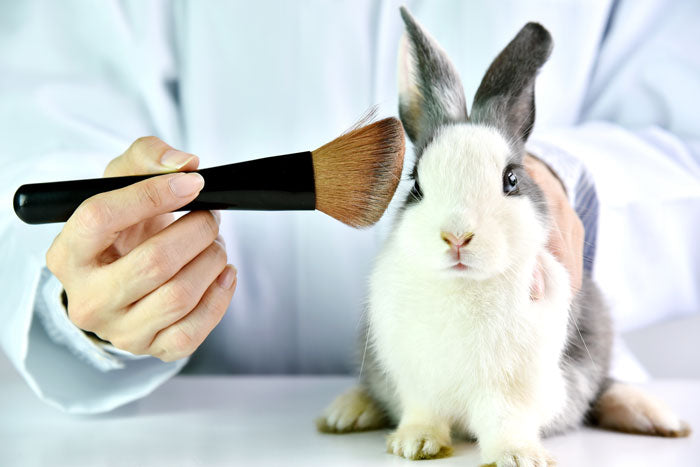
Differences between natural, vegan and cruelty-free cosmetics
Share
You may have been using natural products for some time and have already noticed it.
But, when you start looking, you realize that... There are not only natural products!
There are also cruelty-free and vegan ones.
It all seems to point to the same thing, right?
Well, the truth is that they have (big) differences between them, and you may be buying products without knowing what they really are.
Well, we are going to explain to you in short and without getting involved, what are the differences between each one!
Keep reading:
Vegan cosmetics: what is it?
Beauty and hygiene products that fall into the category of vegan cosmetics respect nature and animals. They are called vegan because the ingredients they contain are only of plant origin. In other words, a vegan product is 100% cruelty-free (unless animals have been used to transport the raw material, and depending on the conditions, it can be considered that they have been mistreated, but that case is very infrequently).
This implies that they completely lack ingredients that come from animals or their derivatives. Therefore, milk, beeswax, collagen or other similar products are not used in its manufacture. Besides, its packaging is plastic-free, to contribute in another way to environmental care.
However!
The ingredients that these products contain may have been processed.
What does that mean?
That, for example, ingredients such as hyaluronic acid may be of plant origin, but have gone through a process that has transformed them into that final result.
This is not why it is dangerous and in fact, all cosmetics go through a series of tests in Europe that assess whether they can be used on human tissues without posing a health risk.
Definition of natural cosmetics
There is no official definition of what a natural product is, as no entity has yet regulated it. Even so, "informally", we can say that a natural ingredient as God intended would have 95% of components or ingredients that are extracted from natural origins. About 50% of these are vegetable or ecological materials and if they include compounds derived from animals.
Therefore, the properties of its formulas, which are normally extracted from ecosystems, show more respect for the skin.
Of course, a natural product may contain collagen, which would not make it vegan. Therefore, beware of buying natural products if you are looking for a 100% vegan cosmetic.
What is cruelty-free cosmetics?
The name clearly indicates that this field of cosmetics is the one that develops products not tested on animals. This means that, during its development, no tests involving animal abuse have been carried out. However, that does not imply that they do not contain ingredients of animal origin.
In other words, a cruelty-free product does not have to be vegan.
For example, products containing plankton or animal milk are often called "cruelty-free".
It is true that there is increasing doubt as to whether these 2 ingredients that we have given you as an example can be considered cruelty free or not.
There are several NGOs that issue these certifications, so this type of certificate does have some minimum requirements.
Now, you have to check that these logos are always one of the following:

Certifications of natural, vegan or cruelty-free cosmetics
It is clear that, although they have some aspects in common, each type of cosmetic differs from the other. For that reason, it is advisable that you research and review the certifications, to check what class a certain product is. Some of the cruelty-free certifications are PETA and Leaping Bunny.
On the other hand, there are V-Label, VeganOK and Vegan as vegan certifications. With respect to the natural ones, Ecocert, Bio Inspecta and Natrue stand out. In case you don't see any certification, try reading the ingredients to get an idea of the composition.
In any case, keep in mind that these organizations are all private, therefore we are also referring to the judgment of a group of people who think that a product is natural for X reasons that they have in mind.
One thing does not remove the other: if they have that certificate, you are ensuring a minimum level of "naturalness", therefore, it is fine. Even so, the conclusion of this section is that these certificates are not official.
Why choose vegan, natural or cruelty-free cosmetics
The differences between natural, vegan and cruelty-free cosmetics do not prevent all of them from being more positive than traditional cosmetics that did not accord any type of concern to those aspects of the product and the manufacturing process.
Of course, the advantages will depend on the decision you make, but they are undoubtedly better than the rest of the cosmetics.
Because of that, you have surely noticed that more and more people are looking for these types of products. If you have not yet decided on these, know several of the favorable points that make them superior:
- Vegans lack synthetic ingredients that cause sensitivity and allergies.
- Those who are cruelty-free show respect for the valuable life and rights of animals.
- The beneficial effects produced by the natural ones are more lasting.
- All those that are contained in plastic-free packaging have a lower environmental impact.
- Vegans can be cheaper because they are less processed.
Having said that, if you have any doubts regarding the difference between one or the other, or you have any doubts about the naturalness of Guuds products, we suggest that you contact us.
We will be happy to clarify your doubts and chat with you about this topic that we like so much!
